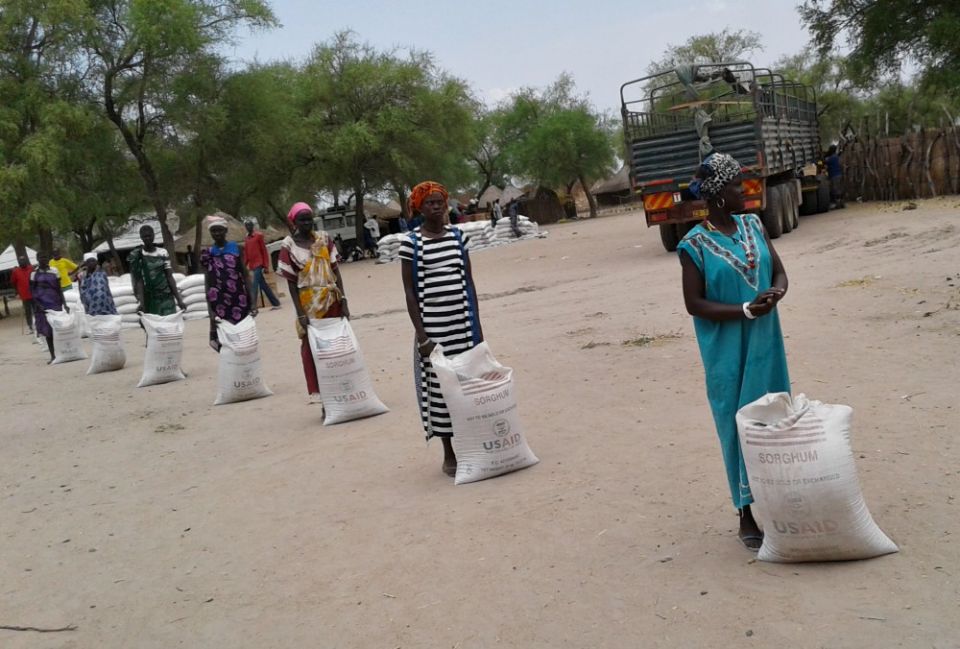
Participants in a U.S. Agency for International Development food security program practice social distancing while waiting to receive food rations in Duk, South Sudan, on April 2. (Courtesy of Catholic Relief Services / Gatluak Miak Deng)
Everyone is affected in some way by the coronavirus pandemic. Some people risk danger by serving the sick and dying. Others struggle with the boredom of isolation. Many people have no way to protect themselves. Still others live with the pain of unemployment, illness or the death of a loved one.
Alone, or with a partner, consider:
- What has been your greatest challenge during the coronavirus crisis?
- How do you feel your hardships compare to other people?
Look for ways in which the pandemic places greater burdens on particular groups of vulnerable people.
COVID-19 threatens devastating impact on world's vulnerable people
NEW YORK — United Nations leaders, humanitarian experts and sister advocates at the U.N. are alarmed by the COVID-19 pandemic's potential to devastate vulnerable communities, particularly refugees, migrants, and women and girls already challenged by economic hardship and social disparities.
"The impact is going to be devastating," said Jennifer Poidatz, vice president of humanitarian response for Baltimore-based Catholic Relief Services.
In a recent telephone interview from Paris, where she is based, Poidatz said, "This is not a three-month thing or a six-month thing. This is a new normal."
She noted that what is particularly alarming about the current crisis is its global reach. "We're used to having multiple crises at the same time, but not in every country we're operating in," she said.
And what makes the situation especially challenging, Poidatz said, "is that the environments we work in are experiencing protracted humanitarian crises in which 61 million people — migrants, refugees — are on the move. And even in those areas where we are working in 'stable environments,' the health infrastructure is weak."
For example, for 600,000 refugees in a confined area, such as the Rohingya refugees in Bangladesh, self-quarantine and social distancing are not options.
"When you have a situation where your house is a temporary structure with one room, how do you do that?" she said.
Multiply that by the hundreds of thousands, and then in dozens of places throughout the world, she said, and "it's pretty awful stuff," Poidatz said.
The gender imbalance is also deeply worrisome, U.N. Secretary-General António Guterres said in an April 9 statement. While early data show "the mortality rates from COVID-19 may be higher for men," he said, "the pandemic is having devastating social and economic consequences for women and girls."
He noted that nearly 60 percent of women globally "work in the informal economy, earning less, saving less, and at greater risk of falling into poverty."
Women do as much as 80 percent of the farming work in the world, and disruption in the food supply chain will have a serious effect on women's income, said Sr. Celine Paramundayil, the representative for the Medical Mission Sisters' nongovernmental organization at the United Nations.
And that is not the only issue of concern. With more men now staying at home, Guterres had earlier sounded an alarm about the increased risk for domestic violence, a worry that is all too real, Paramundayil said.
"There's more pressure on women in so many ways, as women are so often the ones meeting the needs in families and communities," Paramundayil said in an interview with Global Sisters Report.
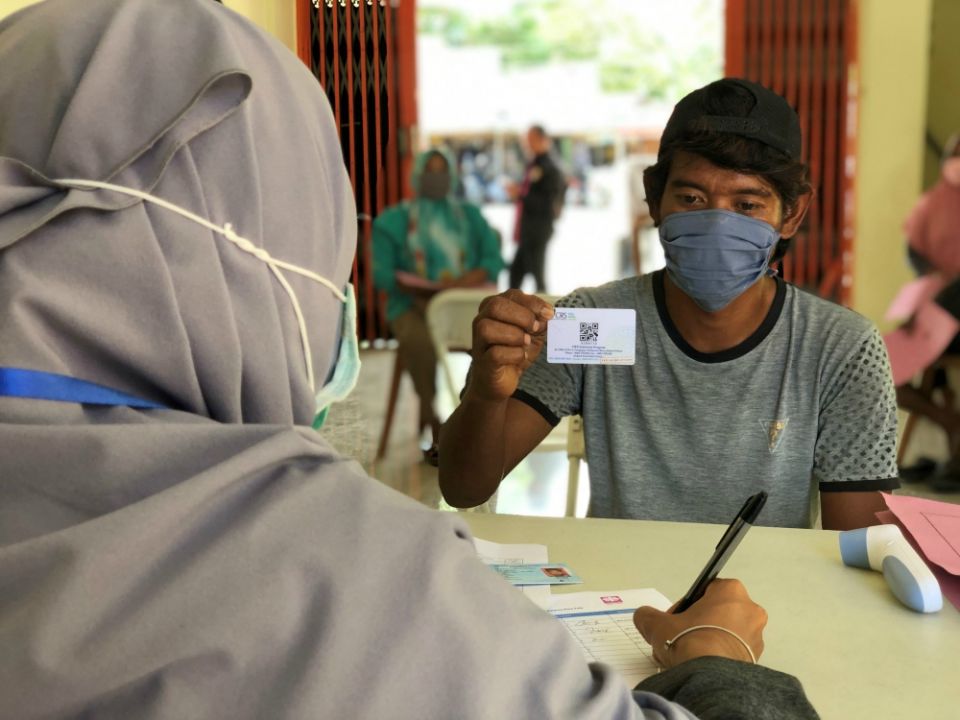
Catholic Relief Services' money distribution in Palu, Indonesia, to families needing cash to retrofit houses damaged in a 2018 tsunami continues despite the coronavirus pandemic. (Courtesy of Catholic Relief Services / Prillimala Angelisca)
Participants in an April 8 webinar sponsored by the Georgetown Institute for Women, Peace and Security expressed similar concerns.
"The outbreak of the virus dramatizes the limits of progress" since the U.N.'s landmark Fourth World Conference on Women, held in 1995 in Beijing, said David Miliband, president and CEO of the New York-based International Rescue Committee, a prominent global humanitarian agency.
"This was supposed to be a year of celebration," Anita Bhatia, an assistant U.N. secretary general and a deputy executive director for U.N. Women, noted of the 25th anniversary of the Beijing conference. But even before the pandemic, she said, it looked like "we were running to stay in place." Now, the year is "turning out to be a catastrophe" for not only the world, but for women and girls in particular.
"We're going to see some awful situations on the ground," she said.
Another reason the pandemic poses a challenge, Guterres said in the April 9 message, is that it "could reverse the limited progress that has been made on gender equality and women's rights." He noted that women are "losing paid employment, women's unpaid care work has increased exponentially as a result of school closures and the increased needs of older people."
"These currents are combining as never before to defeat women's rights and deny women's opportunities," he said. "Progress lost takes years to regain. Teenage girls out of school may never return."
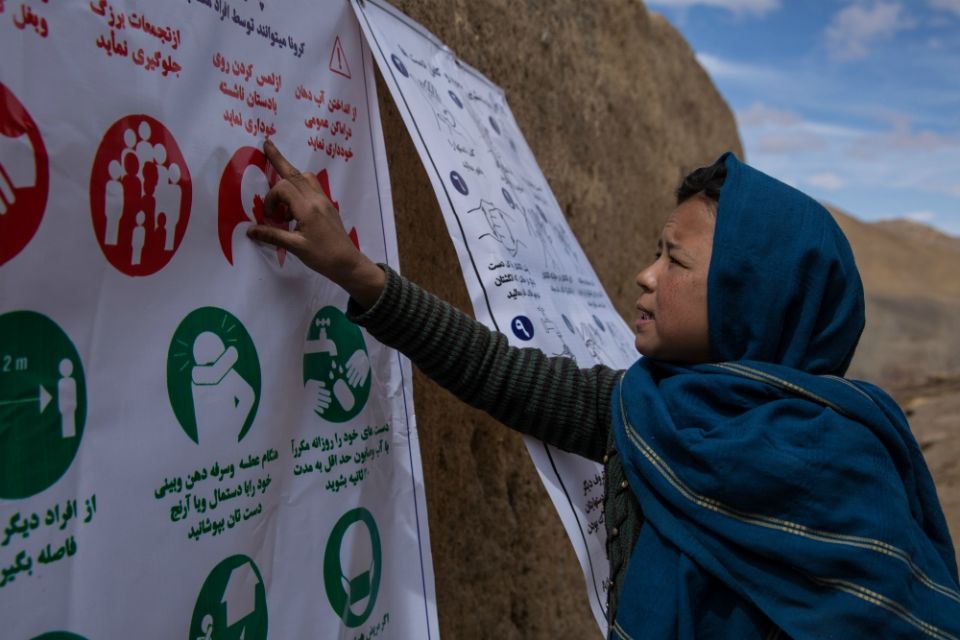
Mina, 11, reads a Catholic Relief Services sign warning about the symptoms and prevention of coronavirus in Largurang village, Bamyan, Afghanistan. (Courtesy of Catholic Relief Services / Stefanie Glinski)
As markets fall and businesses close, "millions of women's jobs have disappeared," the U.N. head said.
Echoing those worries, as well as a recent declaration by Guterres that the crisis is the most serious global challenge since the end of World War II, Sr. Teresa Kotturan, who represents the Sisters of Charity Federation at the U.N., said global efforts to reverse poverty and other social ills will now be put on hold, with alarming effects.
"I would say this is now an unimaginable humanitarian crisis we're facing," she said.
In 2019, the United Nations could take pride in some of the progress being made through its ambitious 2030 agenda, or sustainable development goals, to combat global poverty and other social ills.
"That hope is just remaining at the level of hope," Kotturan said, adding that the pandemic is a huge global setback.
"It's just a dream," she said of the 2030 agenda.
Paramundayil said this is the moment for countries to take a stand in support of the sustainable development goals but acknowledged that such support may not be easy to sustain right now, given the global focus on the pandemic.
"It's an opportunity to affirm the SDGs," she said, "but it won't happen magically."
Kotturan said she is worried.
"Hunger is going to increase, poverty is going to increase," Kotturan said in an interview with GSR. "It's a vicious cycle."
From Haiti, Sr. Denise Desil, mother general of the Little Sisters of St. Thérèse of the Child Jesus, a Haiti-based congregation, told GSR via email that her congregation is facing new challenges, with getting food for an orphanage and nursing home "now a big problem."
"We try to manage the situation now," she said, but "we know later it will be worse."
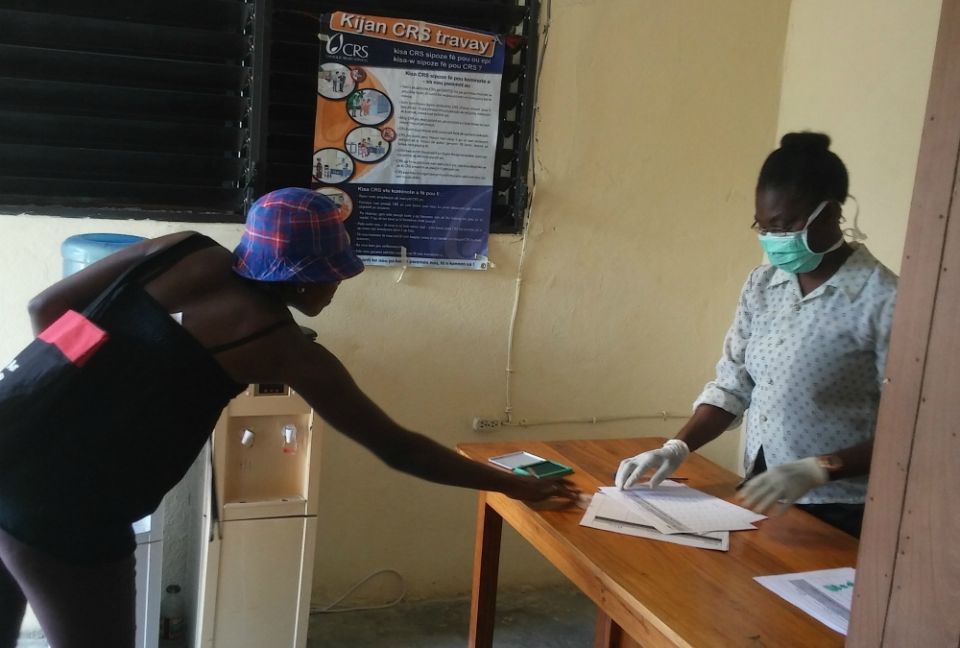
In Haiti, Catholic Relief Services' program continues with cash and voucher programming to 5,300 heads of household after adjusting protocols to reduce risk of transmission of COVID-19. (Courtesy of Catholic Relief Services / Illionair Dorival)
Another sister frustrated by the current situation is Mercy Sr. Deborah Watson, who is based in Buenos Aires, Argentina, is temporarily living at a congregational residence in Burlingame, California.
In both California and Argentina, Watson told GSR, sisters are adhering to shelter-in-place measures. But the effect in Argentina amounts to a "pause" in Mercy ministries in the country's capital city. A women's center where one sister works has closed. A hospice for those who are homeless where another sister works is not accepting any new clients, said Watson, who has lived and worked in Latin America for 35 years, the last 10 in Argentina.
Though the need for physical distancing is obvious now, Watson said the uncertainty for those the sister-assisted programs help is painful and a reminder that the pandemic's effects are being most felt by those who are socially and economically vulnerable.
"Whenever there's a crisis, it's about the most vulnerable, whether it's about age, or health, or economic status or gender," she said. "Those are the most vulnerable."
Poidatz said Catholic Relief Services' commitment to the most vulnerable continues. Already-existing program work continues but with substantial adjustments, she said.
"We have to assume that COVID cases are now everywhere," she said. All of the organization's offices remain open, though more than eight in 10 staffers are now working remotely. (Catholic Relief Services currently works in 114 countries, with 6,990 employees in all.)
For those whose work cannot be done remotely, such as delivering food assistance, alterations are made, such as delivering multiple rations or rations for two months rather than one, Poidatz said.
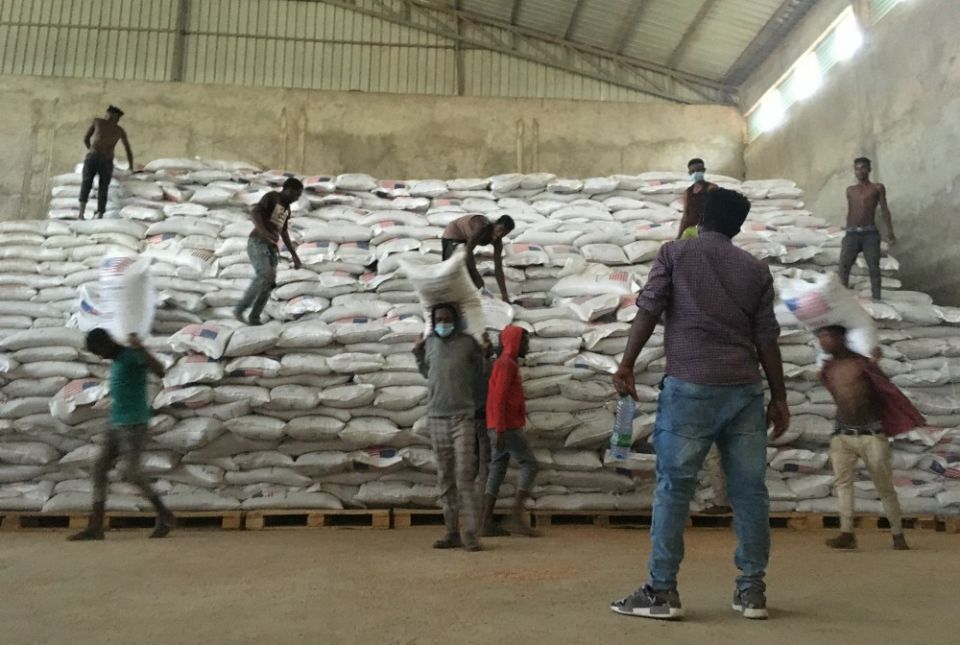
Catholic Relief Services in Ethiopia is moving commodities from its primary distribution points out to rural communities, where the food can be distributed to extremely vulnerable populations in case travel and transport restrictions arise. (Courtesy of Catholic Relief Services)
She added that expatriate staff were given the opportunity to return to their home countries — most are from the United States — but that only 10 percent did so. In-country staff working in remote areas were given a similar opportunity to return to their home cities, she said, but "hardly any took that because they have their families with them."
Looking to the months ahead, "we can't lose sight of the existing needs," such as war-affected countries like Yemen and Syria, Poidatz said. "The list is long."
So far, Poidatz said, support from institutional donors, like the U.S. government, continues. She hopes private donors such as schools, parishes and individuals will continue their support of Catholic Relief Services.
"The situation is quite uncertain," she said, "but our private donors are so generous and so concerned and always seek to do good even in the most challenging of times."
Such support is vital, she said, because Catholic Relief Services supports Catholic health institutions, such as hospitals in Africa, that are "such important actors" in many places throughout the world.
If they are overrun with COVID-19 cases, the potential for a crisis is "extremely worrying," Poidatz said. "I'd be extremely frightened."
Take a moment to read U.N. Secretary-General António Guterres' message on the impact of COVID-19 on women and girls, or watch it here. Alone, or with a partner, consider:
- The United Nations has prioritized 17 goals — known as the Sustainable Development Goals — to combat poverty and other global problems. Goal 5 promotes gender equality and the empowerment of women and girls. Why is this goal necessary?
- How does the coronavirus pandemic challenge progress that has been made for women and girls?
- This article highlights many people, including women, girls, refugees, migrants, orphans, farmers, domestic abuse victims, and people who are homeless, elderly or dying. Choose one of these groups and describe how its vulnerability in the coronavirus pandemic affects you.
Women were overlooked and undervalued in Jesus' time, yet they played a vital role in his ministry. His mother, Mary, was the first to know that Jesus is the son of God. Jesus' friend Martha was among the first to declare this truth.
Pope Francis says that women were rewarded for their love and dedication for Jesus by being entrusted to be the first to spread the good news of his resurrection. Matthew’s gospel shares a crazy scene that included an earthquake and a glowing angel, who shared the shocking news that Jesus was alive:
"Then they went away quickly from the tomb, fearful yet overjoyed, and ran to announce this to his disciples."
Matthew 28:8 [for the full story, read Matthew 28:1-10]
Alone, or with a partner, consider the following:
- Describe a time when you experienced mixed emotions, such as being "fearful yet overjoyed."
- Scripture includes many stories in which women weren’t trusted or believed. Why do you think women weren't respected in those times?
- How has the status of women changed since the time of Jesus? In what ways do you see room for improvement?
- Describe a message about your belief in God or about the ways in which people should live that is difficult to share with other people. Why might others doubt or reject you?
On the day after Easter (April 13, 2020), amid global concerns about the coronavirus pandemic, Pope Francis reflected on the roles women play and the risks they endure. After affirming the women who served as the first witnesses to Jesus' resurrection, Pope Francis stated:
"Today I would like to remind you of what many women do, even in this time of medical emergency, to take care of others: women doctors, nurses, agents of the forces of the order and prisons, employees of basic necessities stores ..., and many mothers and sisters and grandmothers who find themselves locked in the house with the whole family, with children, the elderly and the disabled. Sometimes they are at risk of being subjected to violence, for a coexistence of which they carry too great a burden. Let us pray for them, so that the Lord may give them strength and that our communities can support them together with their families. May the Lord give us the courage of women, to always go forward."
[Read his entire statement here.]
Alone, or with a partner, consider:
- Think of a woman who has cared for you in some way, such as a mother, a doctor or a teacher. Describe what makes her a good caretaker.
- The article and the pope's reflection highlight ways in which women and other vulnerable people are challenged by the coronavirus pandemic. Suggest one change that might be made — during or after this crisis — to improve their lives.
- The church promotes the dignity of people, as well as the dignity of the work they do. How can you affirm the value of efforts that women are making to respond to the coronavirus pandemic?
Most people are aware that the United Nations brings together representatives of many countries —193 in all — to work for peace, human rights and development. Fewer people know of the thousands of non-governmental organizations that serve in advisory roles at the U.N., including more than 100 that represent congregations of Catholic sisters and brothers. Many Catholic sisters provide credible insights at the U.N. because of their work in social services around the world. Read more about them here.
UNANIMA International, one of those organizations, works to help women and children living in extreme poverty to achieve a better quality of life. Read about a sister who served UNANIMA here, and discover ways in which you can support its mission to be a voice for the vulnerable here.
Catholic Relief Services, which serves poor and vulnerable people in 114 nations, is being challenged by the coronavirus crisis. Learn more here about how you can support its efforts to prevent the spread of the virus. Visit here to join CRS in urging Congress to support refugees who need clean water and children at risk of going hungry.
Alone, but joined virtually by Catholics around the world on the day after Easter, Pope Francis led the Regina Caeli. Also known as the "Queen of Heaven,' this centuries-old prayer reminds us that Mary can help strengthen our belief in her son’s resurrection. This belief can transform our lives and give courage to people who are suffering in these times, Pope Francis said. Alone, or with a partner [take turns on the call and response parts] pray:
Call: Queen of heaven, rejoice, alleluia.
Response: The Son you merited to bear, alleluia,
Call: Has risen as he said, alleluia.
Response: Pray to God for us, alleluia.
Call: Rejoice and be glad, O Virgin Mary, alleluia.
Response: For the Lord has truly risen, alleluia.
Let us pray.
God of life, you have given joy to the world
by the resurrection of your Son, our Lord Jesus Christ.
Through the prayers of his mother, the Virgin Mary,
bring us to the happiness of eternal life.
We ask this through Christ our Lord.
Amen.
Tell us what you think about this resource, or give us ideas for other resources you'd like to see, by contacting us at education@globalsistersreport.org
